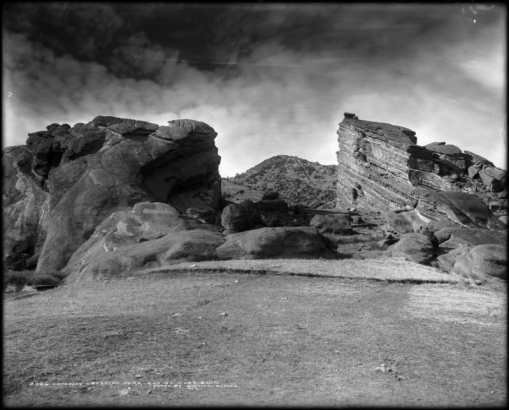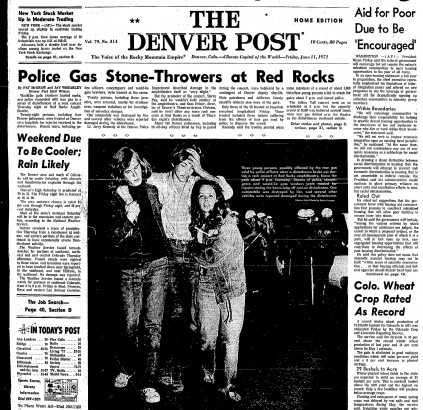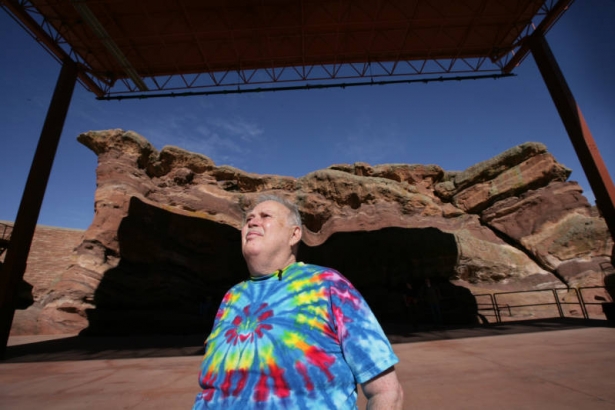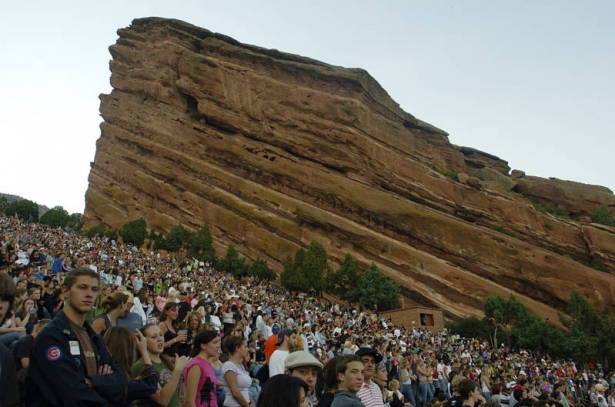On June 10, 1971, a large group of rock fans attempted to bum-rush the gates at Red Rocks Amphitheatre in an effort to see the band Jethro Tull.
In the aftermath of that event, the City of Denver imposed a ban on all "rock" shows at the venue, which didn't turn out quite how the City (mainly Mayor Bill McNichols) planned.
In fact, the city's rock ban actually wound up spurring on one of the most successful concert series of all time and catapulted Red Rocks into the realm of concert venue legend.
They Came from the Hills
If you're having trouble imagining how a Jethro Tull concert could turn into a riot, it might be a case of, "You had to be there to understand." In the late 1960s and early 1970s, plenty of young people felt as though music was an entity that shouldn't be commercialized. They were also not above using the full force of youth to rush into concerts, as was evidenced at the legendary Woodstock Festival.
That dynamic was in full effect at Red Rocks that night when thousands of fans who hadn't purchased tickets congregated in the hills surrounding Red Rocks to catch a free listen to the long sold-out show. The trouble began when the "hill people" decided that they should just go ahead and force their way into the amphitheater.
This did not go down well with the Denver Police Department, who have long held jurisdiction at Red Rocks on concert days.
What happened next was recounted by Chris Van Ness in the June 18, 1971, edition of the Los Angeles Free Press:
The police, feeling that it would be impossible to maintain security in any other way due to the rough terrain, began dropping tear gas out of helicopters which were flying a dangerously low watch over the crowds.
Rather than acting as a deterrent, the tear gas seemed to spur the now-rioters on to further acts of violence As more tear gas began to fill the amphitheater at an alarming rate, the gate-crashers and audience alike began to pick up bottles and rocks to use as ammunition against the police. One car was overturned and burned, and many people suffered injuries ranging from broken bones to gas inhalation.
Not only did the tear gas not quell the riots, it made its way to the stage at the base of the natural amphitheater. The scene could only be described as bedlam, and it had the potential to be a lot worse.
Welcome to World War 3
Backstage at Red Rocks, Barry Fey and the members of Jethro Tull were faced with a conundrum. They could cancel the show and send the paid audience straight into a riot, or they could play the show as planned.
To their everlasting credit, the members of Jethro Tull decided to go on with the show. Jethro Tull lead singer Ian Anderson took to the stage with guitar in hand and greeted the audience saying, "Welcome to World War Three!" And with a full-scale riot playing out in the hills surrounding them, and clouds of tear gas wafting onto the stage, Jethro Tull proceeded to play their full set.
The band's commitment to playing on earned them praise from both the Denver Police Department and Fey, who praised the band in the Los Angeles Free Press saying, "God bless those guys. They're the most professional group I've ever worked with. I don't know anybody else that would have stayed on through all that."
Rock 'n' Roll Aftermath
Reaction to the events at Red Rocks that night came swiftly from Denver Mayor Bill McNichols. The very next day, the mayor swiftly imposed a ban on all rock shows at Red Rocks saying:
As long as I'm mayor, this city is not going to be turned over to rock-throwing hoodlums. If they think they're going to be allowed to run free, attacking innocent people and police officers, they have another guess coming.
McNichols was hardly alone in his view on the future of rock 'n' roll at Red Rocks. Caught up in the moment, a clearly frustrated Fey said that he was done promoting rock shows at Red Rocks. In an interview with the Denver Post on June 11, he said, "If they (the rock artists) want to come into the (Denver) Coliseum (instead of Red Rocks), we'll do it. But most of them know of Red Rocks and wanted to play there."
Though Fey would ultimately change his tune regarding Red Rocks, Sam Feiner, the director of the city Theatres-Arenas Division, was firm in his stance that Red Rocks's time as a rock venue had, "definitely ended." To that end, upcoming shows by hard rock heroes Poco, Chicago, and Stephen Stills were canceled.
The Blame Game
In the aftermath of the riot, there was plenty of blame to go around. While the Denver Police were accused of overreacting to the situation by dropping tear gas, most of the blame was rightly aimed at the gate-crashing rioters.
At the Los Angeles Free Press, Van Ness said, "When it comes to placing blame for the events of last Thursday evening, it must rest with the kids who tried to crash the gate. But the rest of the chemistry is an all-too-familiar formula. The police reacted with fear and stupidity."
At the Rocky Mountain News, music critic Thomas MacCluskey pulled no punches in a column titled, "Rock Rowdies Ruin it for Everyone." MacCluskey pointed out that this was hardly the first time that Denver music fans had acted up.
He recalled that in August 1968, a riot had broken out at an Aretha Franklin show at Red Rocks after the legendary performer told the crowd that she would not be playing because she hadn't been paid. That resulted in a one-year ban on rock shows.
MacCluskey used that as a jumping-off point to school an entire generation for its entitled behavior. "Yes, you 'get-something-for-nothing' generation—in fact, 'get-everything-for-nothing' fools—you caused a one-year ban on rock concerts then...You're just too cute for words."
The angry critic went on to predict that there wouldn't be any rock shows at Red Rocks, "...until your little brothers and sisters come along and realize that what you're trying to do is an utter impossibility. There is no 'something-for-nothing' in this universe."
MacCluskey was right, for a few years anyway.
Barry Fey vs. The Man
Mayor McNichols was not kidding when he said that rock shows at Red Rocks were a non-starter, as the 1972 Red Rocks schedule neatly illustrates. That summer's lineup did not rock, even a little bit. Artists on the bill that year included Joan Baez, Pat Boone and the Carpenters.
And that's the way it was, right up until Fey took the City to court and won the right to once again book rock acts at Red Rocks. With a dash of typical Fey flair and marketing finesse, the legendary promoter christened the now-familiar, "Summer of Stars" series in 1976.
The Bicentennial summer's lineup was considerably more dynamic than it had been in 1971-1975. Acts on the bill included Neil Young, Stephen Stills, David Crosby, Willie Nelson and the Average White Band. (Remember to view these bands through the lens of 1976, when acts like this represented mainstream rock 'n' roll and were considered to be somewhat anti-establishment.)
That summer launched Red Rocks into the stratosphere and as the Summer of Stars established itself, Red Rocks became America's premiere outdoor music venue.
Red Rocks Forever
From U2's iconic "Under a Blood Red Sky" performance in 1983 to dozens of sold-out nights with the Grateful Dead, and a list of artists that's too long to mention (but is conveniently listed on the Red Rocks' Concert Archive), Red Rocks has offered something for everyone.
What's more, an evening at Red Rocks is always tinged with Colorado's natural beauty—the twinkling city lights serving as an almost magical backdrop to the music coming from the stage.
Red Rocks is also a favorite spot for artists and plenty of aspiring artists have it on their bucket lists.
The memorable amphitheater is so far ahead of the curve that Pollstar Magazine, a trade journal for the concert industry, awarded Red Rocks it's Best Outdoor Venue Award 11 years in a row. To give other outdoor venues a chance, Pollstar went ahead and changed the name of the accolade to the Red Rocks Award in 2001 and took Red Rocks out of the running entirely.
Of course, anyone who has ever attended a show (or graduation or church service or film) at Red Rocks knows what a special place it is and how much it means to the people of Denver. And while there have been plenty of rock shows at Red Rocks since the ban was lifted, there hasn't been anything quite like the night Jethro Tull fans almost ruined Red Rocks for everyone.
What's your favorite Red Rocks memory? Share it in the comments section below or on the Western History & Genealogy Facebook Page.





Comments
I was also at the Jethro Tull
I was also at the Jethro Tull concert as one of the gate crashers.There were four or five of us I believe. Some of us had tickets and some of us did not. We went to the gate to allow the ticket holders to get in and to see if the rest of us could score tickets and were told that no one else could enter whether they had tickets or not. We then took my 4 wheel drive Bronco up to the top of the next mountain over and proceeded down the hill towards the concert. We felt like we were the only ones doing this until the helicopters came and dropped the teargas. Groups of people exploded out of the bushes each time.this happened. We reached a small stream at the bottom of the ravine and soaked our shirts with water. covered our faces, and proceeded up the other side to the concert. Fires were burning and Chaos was everywhere but it ended up being one of the most memorable concerts ever!
I was in this mess the day
I was in this mess the day before my 17th birthday! The teargas was outrageous! My friend Dellene was arrested because her BF Mitch handed her the pot to hold. The rest of us hitch hiked back to Aurora to my home (where my my mom was drunk/oblivious) and dropped acid to celebrate my Bday. I am now 68 years old, and proud to have created tales to curl my grandkid's hair... if I'd only had kids first!
Hi Sonni - Thanks for reading
Hi Sonni - Thanks for reading and for sharing your first-hand experiences on that fateful day - we love hearing them!
I heard about the Tull riot
I heard about the Tull riot at school. I went to my first concert in Oct '72. I was 14 & 1 month yrs old. Grand Funk Railroad at The Denver Colosseum. We used to skip school on occasion & go to Red Rocks from Aurora to hang out, smoke a joint, drink some beers. Even tripped on some acid up there once. Used to climb up on top of the big rock left of the stage, (there is a big staircase carved in the rock up there). I went active duty in the Army on 1/6/'76. Saw Tull at the Colosseum for their Passion Play tour, (for 4 bucks). Great show that was. Now ticket prices have gone crazy. Tull came back to Red Rocks a few years ago. Tickets were $90.00. Holy crap! lol I did not go. Sooo... I have never seen a show at RR. : )
I was 20 and visiting friends
I was 20 and visiting friends in Denver in August,1972. They had tickets to that Joan Baez Red Rocks show that week and insisted I must go and see Red Rocks. So I did. Baez stopped at one point in her show and said "I'm told there's an amazing Moon Rise behind me" which she could not see, of course, due to the bandschell. In that moment I made the decision to move to Colorado, from Wisconsin, and I've been here ever since. NO REGRETS!!
Definitely a good decision,
Definitely a good decision, John!
Long live rock and roll, the
Long live rock and roll, the soul of the 60’s and living on through today eh!!!
I was there. We had tickets…
I was there. We had tickets and were waiting for the Jethro Tull. They came out and started playing. There were already to s of people at the gates trying to get in for free. So they had the gates blocked. Then everyone inside including Full are being tear gassed. They didn't pay attention to the wind current. So we are trying to get out. Others are trying to get in. It was a 🌃. I remember trying to get into any car to get away from the rear gas. Finally! A car door opened. And it fell off!
We finally got into our panel wagon and we're half way home when we hear a voice we don't recognize....wtf? There is some unknown guy sitting up in the far back. I won't ever forget the next sentence. So typical for the times.
This guy has no idea who we are or where we are going but out of his mouth comes "Hey, anyone want me to roll a doob". That's all it took. We are family now. I don't remember what happened to our new family member but that was life back then 🌸🌺🌺,🌸
I was there. We had tickets…
I was there. We had tickets and were waiting for the Jethro Tull. They came out and started playing. There were already to s of people at the gates trying to get in for free. So they had the gates blocked. Then everyone inside including Full are being tear gassed. They didn't pay attention to the wind current. So we are trying to get out. Others are trying to get in. It was a 🌃. I remember trying to get into any car to get away from the rear gas. Finally! A car door opened. And it fell off!
We finally got into our panel wagon and we're half way home when we hear a voice we don't recognize....wtf? There is some unknown guy sitting up in the far back. I won't ever forget the next sentence. So typical for the times.
This guy has no idea who we are or where we are going but out of his mouth comes "Hey, anyone want me to roll a doob". That's all it took. We are family now. I don't remember what happened to our new family member but that was life back then 🌸🌺🌺,🌸
Jethro Tull Red Rocks 1971…
Jethro Tull Red Rocks 1971 concert. The stadium was sold out 20,000 seats. But another 40,000 fans showed up. They didn't bum rush the gates, they just went up the mountain behind the stadium and climbed over the rocks. The cops rioted and were trampling people with horses and pepper sprayed people and they had Rottweilers tearing peoples legs up. Then they started dropping tear gas into the stadium from helicopters. The band left the stage but Ian Anderson stood stoicly on one leg for 2 hours without moving and gave the most incredible electric flute solo I have ever heard. They cut the electricity but they turned on the back up generators and Ian kept playing alone on stage with tear gas canisters hitting the stage and almost hitting Ian. The stage crew would come out and grab the canisters and throw them over the rocks behind the stage. Everyone in the audience stayed and put their coats over their heads. Later in the evening someone threw a large rock off the top of the north rock and unalived a motorcycle cop. Ian contracted chemical pneumonia and his voice wasn't as good after that.
Add new comment